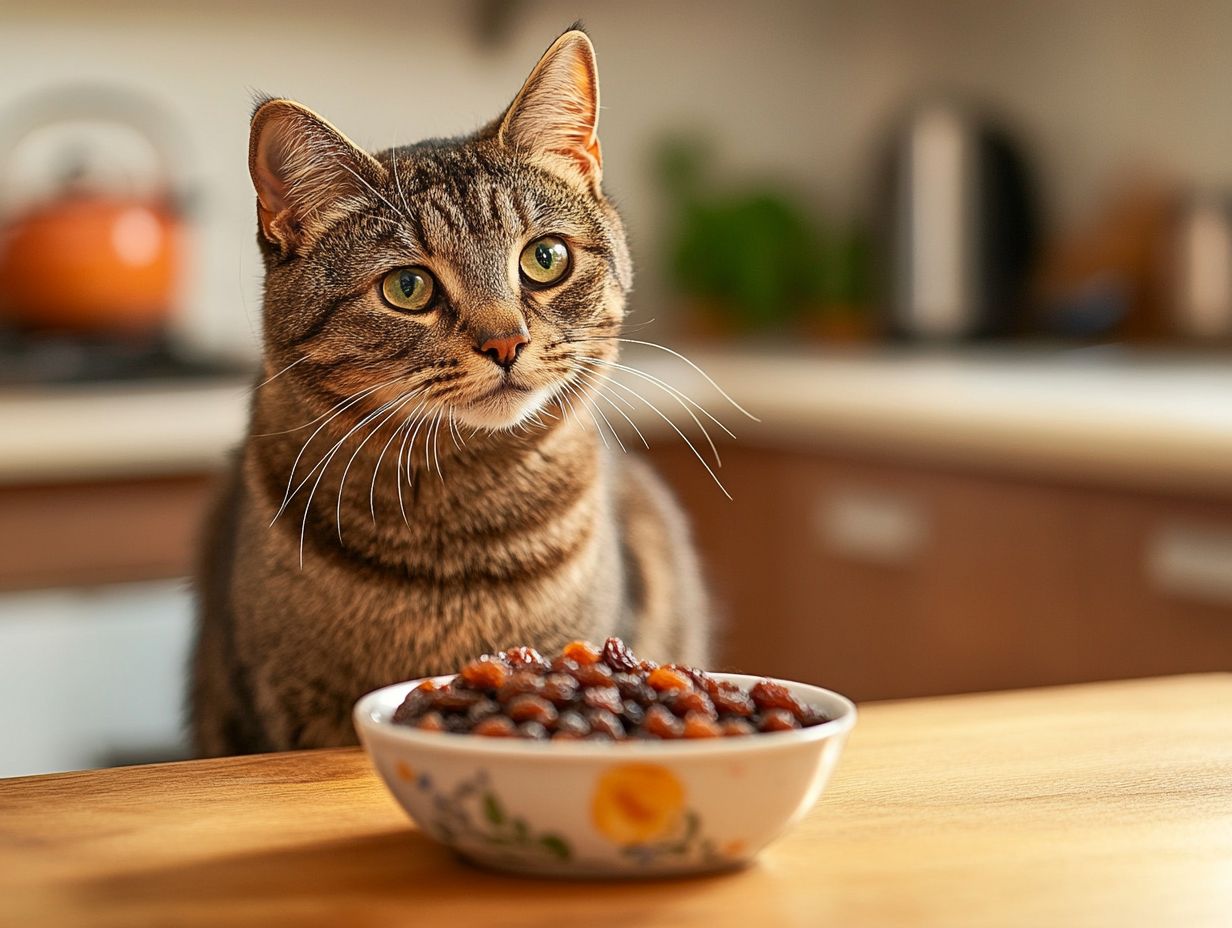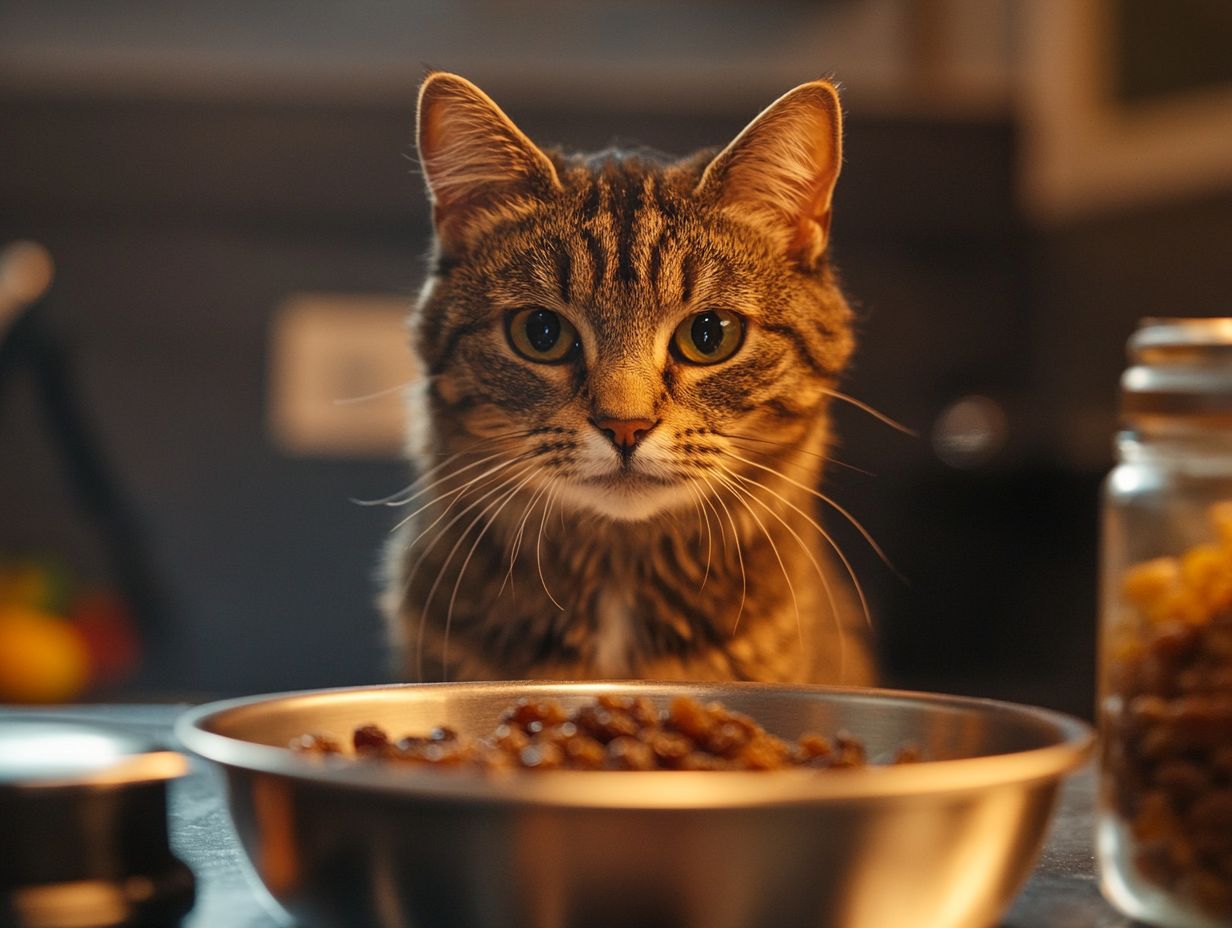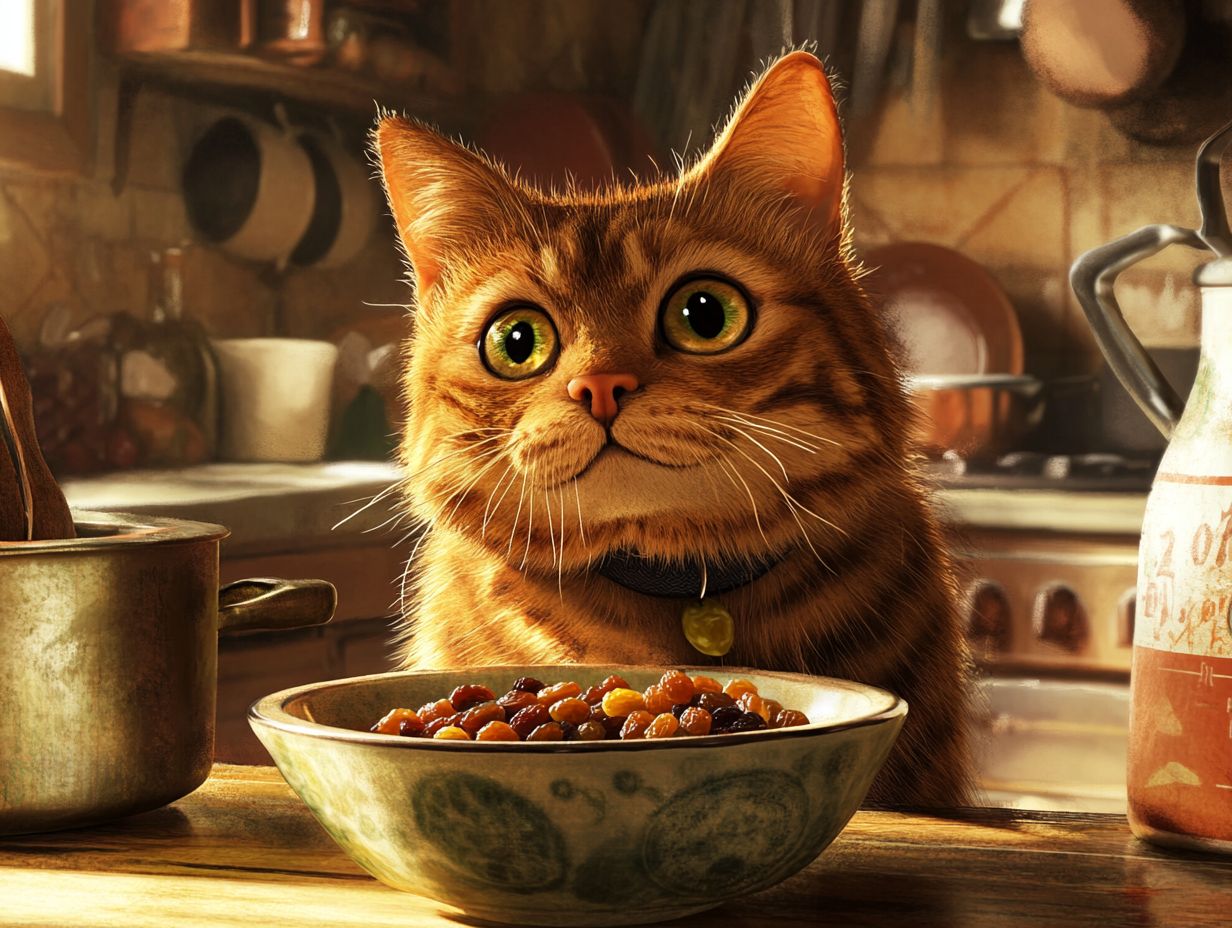While cats are often tempted by human snacks, not all are safe. One particularly dangerous option is raisins, which can pose severe health risks, including kidney failure. Cats are curious creatures, often drawn to the same foods we enjoy, such as cat food or human snacks. Not all human snacks are safe for our feline friends, so it’s crucial for cat owners to be aware of the potential dangers.
This article explores the toxic substances found in raisins and highlights the importance of understanding both toxic and poisonous foods to ensure cat health:
- Identifies symptoms of toxicity
- Discusses treatments
- Provides tips for preventing accidental ingestion
It also highlights other human foods harmful to cats, such as chocolate, onions, and grapes, which can lead to serious health issues. To keep your pet safe, ensure that all human food, especially dangerous items like raisins and chocolate, is securely stored out of reach of your cat.
Keeping your pet safe and healthy starts with being informed about their nutritional needs and the potential dangers of foods like raw eggs and raw meat, which may contain E. coli and Salmonella!
Key Takeaways:

Why Raisins are Dangerous for Cats
Raisins are toxic, with even small amounts potentially causing severe reactions, including kidney failure. The toxicity of raisins can lead to symptoms like severe lethargy, weakness, and abdominal pain, making it essential to seek veterinary guidance.
Understanding the dangers of raisins and other toxic foods is vital for ensuring your cat’s health and safety. If a cat ingests toxic foods, contacting a veterinarian immediately is crucial for proper treatment. This is particularly important in cases of grape toxicity, as prompt intervention can often reduce associated risks.
Toxic Substances in Raisins
Raisins contain unidentified toxic compounds that pose severe health risks to cats, primarily affecting their kidneys. Although the specific toxic components remain largely unknown, they can lead to acute kidney failure.
Understanding what makes raisins toxic is essential for caregivers to protect cats from accidental poisoning. Researchers have linked certain compounds in raisins to physical damage inflicted on cat kidneys, leading to acute kidney failure.
This toxicity is particularly concerning when compared to other harmful foods like garlic and chocolate, which can disrupt normal physiological functions. Just as garlic can lead to hemolytic anemia and chocolate to cardiac arrhythmias, raisins can cause acute kidney injury, necessitating immediate veterinary attention.
Symptoms of Raisin Toxicity in Cats
Recognizing the symptoms of raisin toxicity in cats is crucial for early intervention and medical treatment.
- Lethargy
- Weakness
- Abdominal pain
- Decreased appetite
- Vomiting
- Diarrhea
Pet owners should be vigilant for any changes in their cat’s behavior, as these symptoms may signal a serious reaction to raisins or other toxic foods.
Identifying and Addressing Symptoms

Promptly recognizing and addressing symptoms of raisin toxicity in cats is crucial for effective medical treatment. Caregivers must respond quickly to any signs of distress in their feline companions. The sooner symptoms are identified, the sooner veterinary assistance can be sought.
If a cat exhibits any signs of distress after consuming raisins, obtain veterinary advice immediately for proper care.
What to Do If Your Cat Ingests Raisins
If you suspect your cat has ingested raisins, follow these steps:
- Do not induce vomiting unless instructed by a veterinarian.
- Contact your veterinarian for immediate guidance.
- Keep a record of the amount ingested and the time of ingestion to share with your vet.
Treatment for Raisin Toxicity in Cats
The treatment for raisin toxicity in cats requires immediate medical intervention and supportive care. Possible treatments include inducing vomiting and administering activated charcoal to reduce toxin absorption.
Supportive care may involve:
- Intravenous fluids: Essential for hydration and maintaining kidney function.
- Monitoring for complications: Keeping an eye on potential issues, such as kidney failure.
Early medical intervention significantly improves the likelihood of a full recovery.
Preventing Raisin Toxicity in Cats
Preventing raisin toxicity is essential for responsible pet ownership and contributes to feline long-term health. By understanding which foods are toxic, pet owners can take proactive measures to minimize their cats’ exposure.
Utilizing safe alternatives and effective strategies can significantly reduce risks. Proper food storage and educating family members about toxic foods can help prevent accidental exposure.
Safe Alternatives and Tips for Keeping Cats Away from Raisins

Offering healthier alternatives, such as specially formulated cat food or non-toxic fruits, is crucial for meeting dietary needs without risking exposure to harmful substances.
Examples of safe human foods include:
- Scrambled eggs (1-2 teaspoons)
- Grilled chicken pieces (1-2 small pieces)
- Sliced turkey (1-2 small slices)
- Beef broth (1-2 tablespoons, low-sodium)
- Salmon (1 teaspoon, cooked and boneless)
Post-Care Monitoring
After treatment, it is important to monitor changes in a cat’s behavior or health. Look for signs such as:
- Changes in appetite
- Increased lethargy
- Any recurring symptoms
Early detection of issues can lead to prompt veterinary care, ensuring your cat’s continued health.
Conclusion
Raisin toxicity is a serious concern, and understanding its symptoms, treatment options, and prevention strategies is vital. By educating ourselves and taking proactive steps, we can ensure the safety and well-being of our beloved feline companions.
FAQs about Cats and Raisins
Can cats eat raisins?

No, cats should not eat raisins. Raisins are toxic to cats and can cause serious health issues.
What happens if my cat eats raisins?
If your cat eats raisins, they may experience vomiting, diarrhea, abdominal pain, and decreased appetite. In severe cases, raisin ingestion can lead to kidney failure.
Why are raisins dangerous for cats?
Raisins contain a substance that is toxic to cats, specifically to their kidneys. Even small amounts can be harmful.
Can a cat die from eating raisins?
Yes, if a cat consumes a large amount of raisins, it can lead to kidney failure and potentially be fatal.
What should I do if my cat ate raisins?
If your cat ingested raisins, it is important to seek immediate veterinary care. Your vet may induce vomiting or provide treatment to prevent kidney damage.
Are any other dried fruits dangerous for cats?
Yes, other dried fruits such as grapes, currants, and sultanas are also toxic to cats and should be avoided.
Always consult your veterinarian before introducing new foods into your cat’s diet to ensure their health and safety.